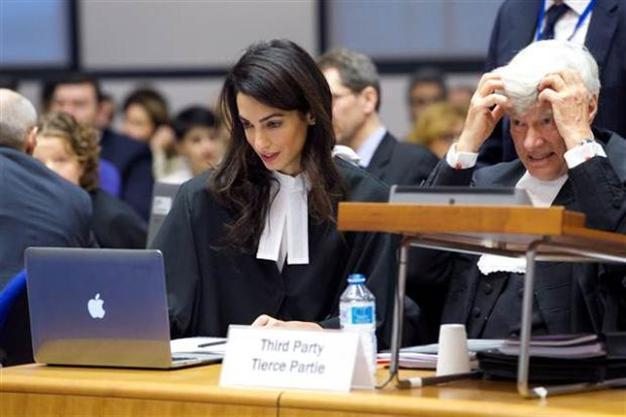ECHR adjourns ruling on Turkey’s Worker’s Party chair over 1915 statements
STRASBOURG - Cihan News Agency

Amal Clooney, the prominent British-Lebanese lawyer and wife of Hollywood celebrity George Clooney, was a member of the legal team representing Armenia. (Photo: ECHR)
The European Court of Human Rights (ECHR) delayed on Jan. 28 its ruling in the case of Workers’ Party (İP) Chairman Doğu Perinçek, who was sentenced in Switzerland for publicly denying that the 1915 killings of Ottoman Armenians amounted to genocide.In his defense, Perinçek reiterated the decision issued by the ECHR’s second chamber on Dec. 17, 2013, which found Switzerland unjust in its sentencing on the grounds of freedom of expression. The court had also determined that opinions on the 1915 incidents were still disputable, he added.
Perinçek stated that genocide was a “judicial phrase” and his personal studies indicated that the Ottoman Empire did not act with a motive to completely destroy Armenian society in Anatolia. He admitted that there were “forced migrations and mutual slaughter,” but claimed that discussion of the events had become a taboo and the term genocide has become a way to insult Turks in Europe.
A national court verdict in Switzerland in 2007 resulted in the case being brought to the ECHR. Perinçek was found guilty by a Swiss court on March 9, 2007 after his participation in a number of conferences in Switzerland in 2005, during which he publicly denied that the Ottoman Empire had committed the crime of genocide against Ottoman Armenians. Denying that the killings amounted to genocide is a criminal offense in Switzerland.
“We are confident that a decision that complies with European laws will be made,” Perinçek said after the Jan. 28 hearing, adding that “attempts to destroy freedom and democracy over Armenian genocide claims in Europe will fail.”
Lawyers Mehmet Cengiz and Stefan Talmon, representing Perinçek in the case, underlined the right to freedom of expression.
Talmon said Perinçek did not use any racist expressions, but simply reacted against the acceptance of the incidents as genocide.
Lawyer Frank Schürmann, representing Switzerland, denied Talmon’s accusation that the Swiss court had violated the 10th article of the European Convention on Human Rights, which regulates human rights.
Amal Clooney, the prominent British-Lebanese lawyer and wife of Hollywood celebrity George Clooney, was a member of the legal team representing Armenia. In the hearing, she said the Ottoman Empire had promised in the Treaty of Sevres that those responsible for the massacres would be tried. Armenia was included in the case not to limit freedom of expression but to defend it, she added.
Former EU Minister Egemen Bağış, former main opposition Republican People’s Party (CHP) leader Deniz Baykal, and CHP Deputy Head Haluk Koç were all in attendance during the hearing. Around 200 Turks were gathered in front of the court in support of Perinçek, while a separate group of Armenians was also gathered nearby.
According to Armenians and many historians, up to 1.5 million Ottoman Armenians were killed starting in 1915 in a systematic campaign. Turkey denies that the deaths amounted to genocide, saying the toll during mass deportations of Ottoman Armenians has been inflated and that those killed in 1915 and 1916 were victims of broader unrest during World War I.
Perinçek had applied to the ECHR over claims that the Swiss courts had breached his right to freedom of expression. The ECHR agreed on Dec. 17, 2013 that his statements in Switzerland fell within the bounds of freedom of expression.
The ECHR ruling stated that “free exercise of the right to openly discuss questions of a sensitive and controversial nature is one of the fundamental aspects of freedom of expression and distinguishes a tolerant and pluralistic democratic society from a totalitarian or dictatorial regime.”
Switzerland objected to the judgment, after which the case was taken to the ECHR’s Grand Chamber for the final verdict. The Grand Chamber approved the inclusion of the state of Armenia as a third party litigant in the case in September.
















